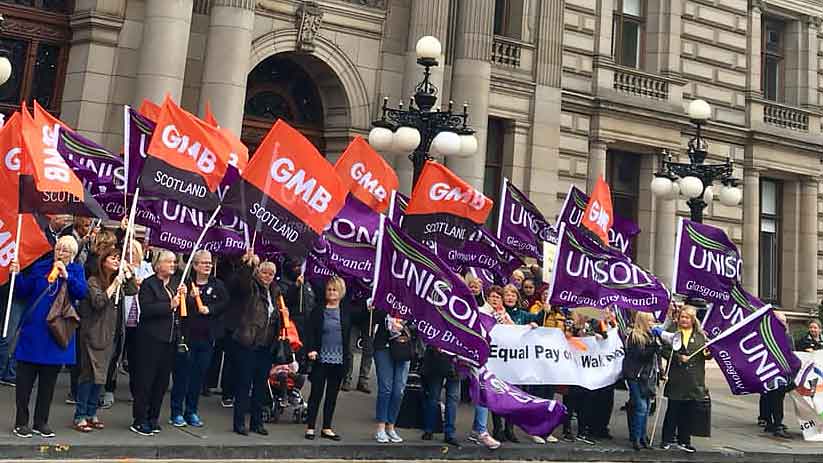Thousands of low-paid women in Glasgow are striking for equal pay next Tuesday and Wednesday – 23 and 24 October. In 2018. In one of the UK’s largest councils.
Around 8,000 women including school administration workers, learning support workers in schools, nursery workers, home carers, cleaners, caterers and other council workers are taking action over the city council’s failure to settle a long-standing equal-pay dispute.
It will be the largest industrial action of its type since the Equal Pay Act was passed in the wake of the Ford machinists’ strike, immortalised in the film and stage show Made In Dagenham, in the 1970s.
The strike will affect schools, nurseries, home care, cleaning and catering across the city – but UNISON regional organiser Mandy McDowell is keen to stress that the union and its members will make sure there is full life and limb cover for services helping vulnerable people.

The STUC will by hosting a strike rally on from 11.30am to 2.0pm on the first day of the strike, Tuesday 23 October.
Assemble at Glasgow Green from 11.30 for a march to George Square, where the rally will hear from a number of speakers.
UNISON has been pursuing a co-ordinated strategy of litigation, negotiation and industrial action if necessary, to secure justice for members who have been denied equal pay.
Over the last decade, the council has, under different political leaderships, fought legal claims for equal pay all the way to Scotland’s highest court.
But at the beginning of this year, after all legal avenues backed the women, the council’s current political leadership promised to negotiate a settlement for the past injustice.
But after 10 months and more than 20 meetings, UNISON and the GMB have said enough is enough.
In September, a UNISON ballot of nearly 3,000 education workers saw a 90% vote for strike action. A second UNISON ballot of more than 2,000 home carers, school cleaners and caterers, and other staff employed by the council’s arms-length company Cordia saw 99% backing action.
A GMB ballot of its members working for Cordia resulted in 98% backing for strike action.

Mandy McDowell called the ballot results massive and showed that “the council doesn’t really know how members feel”.
UNISON Scotland’s local government vice-chair Carol Ball welcomed the ballot results as “a fantastic show of strength by an overwhelmingly female workforce who have been treated disgracefully for years. They are now standing up and fighting back.”
And UNISON Glasgow chair Mary Dawson added: “We have given the council 10 months to make progress on addressing the historical discrimination suffered by these workers.
“However, the council has agreed nothing, offered nothing and all we have had are meetings about meetings and talks about talks. It’s time for some action.”
12 years and counting…
The women have been waiting for more than a decade for equal pay.
Glasgow council introduced a new pay and grading scheme in 2006, which was supposed to put an end to pay inequality based on gender.
However, it included protections lasting three years for bonuses paid to men, but not women.
That prompted employment tribunal cases arguing that it was both unfair and unlawful to continue pay discrimination for three years after the new scheme was put into place.
At the same time, the scheme itself gave rise to employment tribunal claims that far from ending pay inequality, it was itself discriminatory.
Women in traditionally female jobs – people such as caterers, cleaners and care assistants – found they were being paid less than men in jobs such as refuse collection. Although the jobs were of equal value and should have attracted equal pay, they argued that the scheme scored the skills of jobs traditionally associated with men higher than those needed for what were seen as “women’s work”.
To complicate matters further, in the intervening period, the council created Cordia to provide care for more than 80,000 vulnerable people as well as catering and cleaning in the city’s schools. The company has been the subject of its own equal pay claims.

The various cases made their way through employment tribunals and employment appeals tribunals before entering the court system and ending up in Scotland’s highest court, the Court of Session.
The political composition of the council has changed while all this was going on, but Ms McDowell asked why – even if it was going to fight the cases all the way – the council didn’t draw up a Plan B for if it lost.
The last of the cases ended in November 2017, when the Court of Session ruled in favour of the claimants, quashing an earlier ruling by the Employment Appeal Tribunal that the council’s job evaluation scheme was valid under equal pay laws.
The Court of Session judges said the burden of proof rested with the council – it had to prove that its scheme complied with the law, but had failed to produce enough evidence that it did.
UNISON welcomed the court’s final decisions, with the union’s Scottish secretary Mike Kirby calling it “great news for low paid women workers”.
He added: “These women have already waited long enough to receive the pay they have worked hard for and deserve. It’s time for Glasgow City Council to do the right thing and pay up on equal pay.”
At the same time, SNP council leader Susan Aitken declared: “The city government was elected on a commitment to improve industrial relations in Glasgow City Council, including resolving inherited outstanding equal pay cases. Today’s ruling has not changed that position.”
More than 10 months down the line, however …

Find out more about UNISON and equal pay
Earlier story: Glasgow women to march in their fight for equal pay (9 February 2018)









